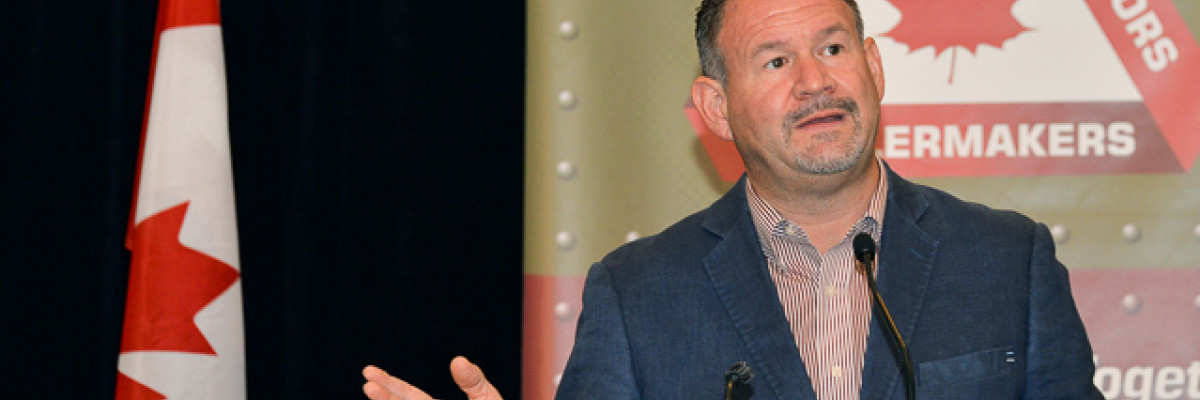IVP Joe Maloney leads a discussion about duplicative safety training and the need for a national standard.
View Photo Gallery (5 photos)
Event brings together owners, contractors and union
MORE THAN 160 construction industry leaders representing owners, contractors and Boilermakers gathered at Niagara on the Lake in Ontario, August 18-20 to seek solutions to shared challenges. Among the participants were 19 owner representatives from Bruce Power, Irving Oil, New Brunswick Power, Nova Chemicals, Nova Scotia Power, Ontario Power Generation, Shell Canada Ltd., Syncrude Canada Ltd. and TransCanada. Representatives from various government agencies also participated.
International Vice President Joe Maloney opened the conference and led discussions on several key issues.
The event included a dinner and awards ceremony to recognize the achievements of top apprentices across Canada.
Maloney urges national training standard
IVP MALONEY INTRODUCED the issue of duplicative training in the areas of fall prevention, respirator use and working in confined spaces.
He noted that Boilermakers are usually required to retake this training each time they travel to a different province for work — even though the training regimen is largely the same at each location. That duplication of effort, performed on company time, collectively costs owners as much as $4.1 million annually, according to a report by Prism Economics and Analysis and Griffiths Sheppard Consulting.
One of the study’s authors, Prism’s John O’Grady, presented the report to conference participants and later participated in a panel discussion with safety representatives from government and labor.
Maloney, urged support for the report’s recommendation to create a national, work-ready, occupational health and welfare standard that “meets or exceeds all provincial and owner requirements.” Once developed by the Boilermakers union or by a collaboration of multiple trades, the standard would be presented to the owner associations and provinces for endorsement and acceptance.
Workforce projections rise
PLANNED SHUTDOWNS IN the Alberta oil sands region, a major refurbishment at the world’s largest nuclear power plant (Bruce Power, near Toronto), and other projects will place growing pressures on the availability of Boilermakers to do the work, according to forecasts developed by the union in conjunction with Industrial Information Resources.
Nationally, work hours are expected to hit 12.5 million for 2015 and 18.1 million for 2018. Meanwhile, workforce shortfalls are estimated at 409 Boilermakers in 2015, rising to 2,686 in 2018.
Discussions by conference participants focused on how best to avoid the shortfall, including stepped up organizing, expanded apprenticeships and more intelligent use of certified welders.
Health and safety receives emphasis
HEALTH AND SAFETY, always a focus of tripartite meetings, received special emphasis, including a presentation by Dr. L. Casey Chosewood, M.D., M.P.H. Chosewood is Director of the Office of Total Worker Health for the National Institute of Occupational Safety and Health, with the Centers for Disease Control and Prevention in Atlanta.
He spoke about the need to recognize that people bring their problems at home to the workplace and their problems at work to their homes. These situations cause unhealthy and sometimes dangerous situations, often brought on by fatigue, emotional issues and other stressors.
Dr. Chosewood explained that a “total worker health” approach by employers recognizes the necessity of not only ensuring safety at the workplace but also supporting workers so that they leave in better overall health at the end of the day. He encouraged health fairs at work and creating healthier environments on the job through better employer policies. Total worker health programs, he said, promote better health at home as well as at work, but must have buy-in from employees to be effective.
Jason McGinnis, Boilermaker Director for Health and Safety, followed Chosewood’s presentation with a review of the Boilermakers’ Total Worker Health Program currently under development. He said the program takes a multi-faceted approach with initiatives such as health and safety surveys, information sharing through the Canadian Boilermaker website and other venues, the use of personally customizable software programs for diet and exercise, health check clinics, and peer to peer video presentations in which members talk about their health issues.
Grant Jacobs, National Training Director, and Assistant National Training Coordinators Jonathan White and Jim Beauchamp also discussed how safety and health instruction is incorporated into their programs.
Conference includes spectrum of interests
A PRIMARY STRENGTH of the tripartite conferences is the involvement of all partners and contributors to the industry. In addition to the presentations cited above, participants received updates from the Boilermaker Contractors’ Association, National Training, the General Presidents’ Maintenance Committee, the Ontario Construction Secretariat, Ontario Power Generation, Syncrude Canada, Shell Canada, Helmets to Hardhats, Energy East Pipeline and Grand River Employment and Training.
The conference concluded with caucus breakouts by owners, contractors and unions, followed by summaries and discussion of those meetings.











